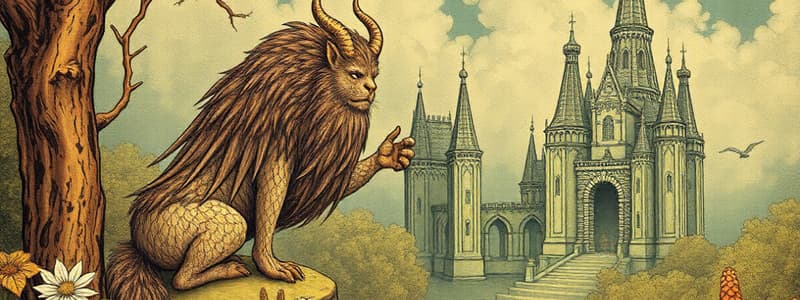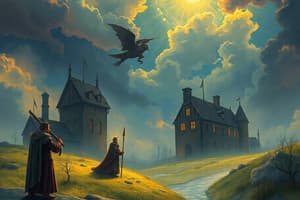Podcast
Questions and Answers
Which characteristic is LEAST representative of Old English literature?
Which characteristic is LEAST representative of Old English literature?
- Emphasis on oral tradition and storytelling.
- Use of epic poetry to convey cultural values.
- Exploration of themes like exile and loss.
- Influence from French language and culture. (correct)
How did the Norman Conquest of 1066 MOST significantly impact English literature?
How did the Norman Conquest of 1066 MOST significantly impact English literature?
- It introduced classical learning and Renaissance ideals.
- It ushered in French influences, shaping language and genres. (correct)
- It led to a decline in the production of religious texts.
- It resulted in the dominance of Old English literary forms.
Which of the following BEST describes the significance of Geoffrey Chaucer's The Canterbury Tales?
Which of the following BEST describes the significance of Geoffrey Chaucer's The Canterbury Tales?
- It primarily explores themes of chivalry, courtly love, and knightly honor.
- It established the conventions of Old English epic poetry.
- It served as a religious text, blending Christian themes with Anglo-Saxon traditions.
- It provides a diverse portrayal of medieval society through the stories of pilgrims. (correct)
What is a primary characteristic that distinguishes Renaissance drama from earlier forms of English literature?
What is a primary characteristic that distinguishes Renaissance drama from earlier forms of English literature?
Which of the following statements BEST describes the lasting impact of William Shakespeare on English literature?
Which of the following statements BEST describes the lasting impact of William Shakespeare on English literature?
How did the King James Bible influence English literature?
How did the King James Bible influence English literature?
What is a defining characteristic of the Metaphysical poets of the Renaissance period?
What is a defining characteristic of the Metaphysical poets of the Renaissance period?
Which of the following BEST represents a theme explored in Sir Gawaine and the Green Knight?
Which of the following BEST represents a theme explored in Sir Gawaine and the Green Knight?
Which of the following best describes a central theme explored by novelists during the Restoration and 18th century?
Which of the following best describes a central theme explored by novelists during the Restoration and 18th century?
How did the Romantic movement's emphasis on emotion and individualism influence literary works of the time?
How did the Romantic movement's emphasis on emotion and individualism influence literary works of the time?
Which of the following literary trends is most characteristic of the Victorian period?
Which of the following literary trends is most characteristic of the Victorian period?
Which of the following best characterizes a key feature of Modernist literature?
Which of the following best characterizes a key feature of Modernist literature?
How does Postmodern literature typically differ from Modernist literature in its approach to narrative and meaning?
How does Postmodern literature typically differ from Modernist literature in its approach to narrative and meaning?
In what way did Samuel Johnson's 'A Dictionary of the English Language' (1755) impact the literary landscape of the 18th century?
In what way did Samuel Johnson's 'A Dictionary of the English Language' (1755) impact the literary landscape of the 18th century?
What distinguishes Horace Walpole's 'The Castle of Otranto' from earlier novels, marking its significance in literary history?
What distinguishes Horace Walpole's 'The Castle of Otranto' from earlier novels, marking its significance in literary history?
How did the publication of Wordsworth and Coleridge's 'Lyrical Ballads' (1798) influence the course of English literature?
How did the publication of Wordsworth and Coleridge's 'Lyrical Ballads' (1798) influence the course of English literature?
How do the novels of Jane Austen, such as 'Pride and Prejudice' and 'Emma,' contribute to our understanding of the Romantic period, despite their focus on social manners?
How do the novels of Jane Austen, such as 'Pride and Prejudice' and 'Emma,' contribute to our understanding of the Romantic period, despite their focus on social manners?
What role did the Pre-Raphaelite Brotherhood play in the Victorian art and literary scene?
What role did the Pre-Raphaelite Brotherhood play in the Victorian art and literary scene?
Flashcards
English Literature
English Literature
Literature written in the English language, from Anglo-Saxon times to today.
Anglo-Saxon Period
Anglo-Saxon Period
The period from c. 450-1066, featuring oral tradition and epic poems.
"Beowulf"
"Beowulf"
An epic poem reflecting warrior culture, heroism, and mortality.
Medieval Period
Medieval Period
Signup and view all the flashcards
"The Canterbury Tales"
"The Canterbury Tales"
Signup and view all the flashcards
Renaissance Period
Renaissance Period
Signup and view all the flashcards
William Shakespeare
William Shakespeare
Signup and view all the flashcards
Metaphysical Poets
Metaphysical Poets
Signup and view all the flashcards
The Restoration (1660)
The Restoration (1660)
Signup and view all the flashcards
The Enlightenment (18th Century)
The Enlightenment (18th Century)
Signup and view all the flashcards
Alexander Pope
Alexander Pope
Signup and view all the flashcards
"Gulliver's Travels"
"Gulliver's Travels"
Signup and view all the flashcards
The Romantic Movement
The Romantic Movement
Signup and view all the flashcards
"Lyrical Ballads" (1798)
"Lyrical Ballads" (1798)
Signup and view all the flashcards
Jane Austen's novels
Jane Austen's novels
Signup and view all the flashcards
Victorian Period (1837-1901)
Victorian Period (1837-1901)
Signup and view all the flashcards
Modern Period (1901-1945)
Modern Period (1901-1945)
Signup and view all the flashcards
Postmodern Literature
Postmodern Literature
Signup and view all the flashcards
Study Notes
- English literature includes poetry, prose, and drama in the English language.
- Spanning from the Anglo-Saxon era to today, it mirrors Britain's and the world's evolving cultural, social, and political scenes.
Anglo-Saxon Period (c. 450-1066)
- Old English literature is known for its oral tradition and epic poems.
- "Beowulf" stands out as an epic poem reflecting warrior culture values, exploring heroism, good versus evil, and mortality.
- Poems like "The Wanderer" and "The Seafarer" explore exile, loss, and life's harshness.
- The writings of Cædmon and Cynewulf blended Christian themes with Anglo-Saxon traditions.
Medieval Period (1066-1485)
- The Norman Conquest in 1066 brought French influence.
- Middle English literature included romances, ballads, and allegories.
- Geoffrey Chaucer's "The Canterbury Tales" portrays medieval society through pilgrims' stories.
- "Sir Gawain and the Green Knight" explores honor, temptation, and courtly love.
- Mystery and morality plays were common forms of religious drama.
Renaissance Period (1485-1660)
- The Renaissance saw renewed interest in classical learning that influenced English literature.
- William Shakespeare is celebrated for his tragedies like "Hamlet," "Othello," "King Lear," and "Macbeth," as well as comedies, histories, and romances.
- Shakespeare's plays explore love, ambition, revenge, and the human condition, and his language and dramatic techniques have had a lasting impact.
- Christopher Marlowe, Ben Jonson, and John Webster are notable playwrights from the Elizabethan and Jacobean periods.
- Edmund Spenser's "The Faerie Queene" embodies Renaissance ideals and explores virtue and morality.
- The King James Bible, published in 1611, significantly impacted English language and literature.
- Metaphysical poets like John Donne, George Herbert, and Andrew Marvell used wit, paradox, and conceits to navigate complex philosophical and religious themes.
Restoration and 18th Century (1660-1798)
- The Restoration in 1660 boosted drama and satire.
- John Dryden was a key figure, writing plays, poems, and critical essays.
- The 18th century, or the Age of Reason, prioritized reason, order, and classical ideals.
- Alexander Pope is known for his satires and heroic couplets.
- Jonathan Swift's "Gulliver's Travels" satirizes human nature and society.
- Samuel Johnson's "A Dictionary of the English Language" (1755) was a landmark achievement in lexicography.
- The novel became a major literary form, with Daniel Defoe ("Robinson Crusoe"), Samuel Richardson ("Pamela"), and Henry Fielding ("Tom Jones") exploring social mobility, morality, and individual experience.
- Horace Walpole's "The Castle of Otranto" started the Gothic novel genre, adding mystery, horror, and the supernatural.
Romantic Period (1798-1837)
- The Romantic movement emphasized emotion, imagination, and individualism.
- William Wordsworth and Samuel Taylor Coleridge's "Lyrical Ballads" (1798) is considered the beginning of the Romantic period.
- Wordsworth's poetry celebrated nature's beauty and power.
- Coleridge's poems explored the supernatural and the exotic.
- Lord Byron, Percy Bysshe Shelley, and John Keats wrote about love, beauty, freedom, and the sublime.
- Jane Austen's novels, including "Pride and Prejudice" and "Emma," showed English society and manners.
- Mary Shelley's "Frankenstein" is a Gothic and science fiction work.
Victorian Period (1837-1901)
- This era was marked by social, economic, and technological change.
- Novels became highly popular, with Charles Dickens ("Oliver Twist," "Great Expectations"), William Makepeace Thackeray ("Vanity Fair"), and the Brontë sisters (Charlotte Brontë's "Jane Eyre," Emily Brontë's "Wuthering Heights," Anne Brontë's "The Tenant of Wildfell Hall") exploring class, gender, morality, and social justice.
- George Eliot (Mary Ann Evans) wrote novels like "Middlemarch," realistically portraying provincial life.
- Alfred, Lord Tennyson, as Poet Laureate, wrote poems reflecting Victorian values and concerns.
- Robert and Elizabeth Barrett Browning were known for dramatic monologues and love poetry.
- The Pre-Raphaelite Brotherhood sought to revive early Renaissance art.
Modern Period (1901-1945)
- The Modern period was defined by experimentation, fragmentation, and disillusionment after World War I.
- Modernist writers challenged traditional forms.
- Virginia Woolf ("Mrs. Dalloway," "To the Lighthouse") used stream of consciousness to explore characters' inner lives.
- James Joyce's "Ulysses" is a modernist novel employing experimental techniques to explore human consciousness.
- T.S. Eliot's poetry, like "The Waste Land," mirrored modern society's fragmentation and alienation.
- Joseph Conrad, D.H. Lawrence, and E.M. Forster are other significant modernist writers.
- Georgian poets, such as Rupert Brooke and Walter de la Mare, focused on nature and beauty.
Postmodern Period (1945-Present)
- Postmodern literature features self-reflexivity, irony, and questioning of grand narratives.
- Boundaries between fiction and reality are often blurred.
- Samuel Beckett's plays, such as "Waiting for Godot," explore existential themes and the absurdity of human existence.
- Key authors include George Orwell, Salman Rushdie, Margaret Atwood, and Don DeLillo.
- Contemporary literature is diverse, reflecting society's multiculturalism.
Studying That Suits You
Use AI to generate personalized quizzes and flashcards to suit your learning preferences.




